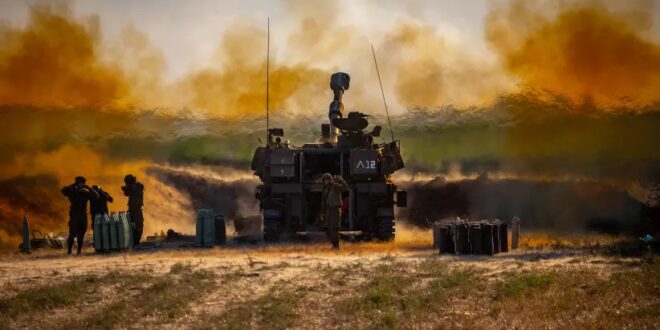Hamas is trying to build a winning narrative around the fighting and keep the link to Jerusalem alive.
Despite a freshly signed ceasefire between Israel and Palestinian terrorist groups in the Gaza Strip, the IDF Military Intelligence Directorate is already preparing for the next round of violence to break out.
The intelligence division (Aman) believes Hamas is still in the midst of fully understanding the damage caused to it during Operation Guardian of the Walls. The terrorist group is also trying to build a winning narrative around the fighting, which caused extreme damage to the already devastated enclave, and keep the link to Jerusalem alive.
On Wednesday, Hamas leader Yahya Sinwar downplayed the damage to its military infrastructure inflicted during the 11-day operation. He threatened to renew fighting if Israel “violates” al-Aqsa Mosque in Jerusalem.
“We are ready for the great battle if the enemy commits a great folly in Jerusalem and the holy sites,” Sinwar said. “We wanted to deliver a message to the occupation and the world that we do not make threats haphazardly – so that the world knows that al-Aqsa has men who protect it.”
Violence between the Israel Police and Palestinian worshipers on the Temple Mount during the final days of Ramadan sparked the rocket fire on the capital, which led the IDF to carry out intensive strikes on Hamas and Palestinian Islamic Jihad targets across the blockaded coastal enclave.
Should Sinwar follow through with his threat, the IDF says it has hundreds of targets ready to strike and is continuing to add more.
According to an assessment by Aman, Mohammed Deif, the commander of Izzadin al-Qassam, the so-called “military” wing of Hamas, wanted to carry out several attacks against Israel, including a cross-border raid targeting troops or civilians, as well as overwhelm the Iron Dome air-defense system with large rocket salvos.
Thanks to superior intelligence gathered prior to the operation and during the fighting, and cooperation with other security bodies, the IDF was able to thwart most attacks planned by the group. It hit tunnels with operatives inside and eliminated several anti-tank guided-missile cells, leaving only a few Kornets, or Russian anti-tank guided missiles, in the hands of Hamas and PIJ.
But, the terrorist groups were able to fire hundreds of rockets toward Israel in the first few days of fighting, effectively overwhelming the Iron Dome protecting Ashkelon, which at the same time experienced a malfunction. Two women were killed in that salvo when rockets slammed into residential areas.
Both the IDF and Hamas are claiming to have won the battle. The IDF said it destroyed Hamas’s strategic underground tunnel network and killed senior operatives, some of them key figures in the group’s missile program.
The Hamas-run Health Ministry in Gaza said at least 243 Palestinians were killed during the fighting, including 66 children and teens, with 1,910 people wounded. The IDF said more than 100 operatives belonging to the terrorist groups were killed and that some of the civilian casualties were caused by Hamas rockets falling short or civilian homes collapsing after an airstrike on Hamas’s tunnel network.
More than 80 operatives were killed during the fighting, 57 from Hamas and 22 from PIJ, Sinwar told the Associated Press in his first interview since the fighting ended.
While the IDF understands that it was not able to destroy the rocket arsenals in the blockaded Gaza Strip, it believes the terrorist groups have been deterred from entering into another war with Israel anytime soon.
During the fighting, rockets were also fired by Palestinian groups in southern Lebanon toward Israel, causing incoming rocket sirens to be activated in Acre and Haifa’s bayside suburbs for the first time since the Second Lebanon War in 2006.
Though Hezbollah remained silent during the fighting, on Wednesday, its leader, Hassan Nasrallah, threatened “regional war” should Israel attack holy sites in Jerusalem.
“The Israelis must understand that breaching the holy city and al-Aqsa Mosque and sanctuaries won’t stop the Gazan resistance,” he said in a cough-filled speech, adding that “Jerusalem means a regional war. All the resistance movements cannot stand by and watch this happening if the holy city is in real, grave danger.”
Even though the IDF believes Hezbollah has been deterred from initiating a war with Israel, it understands that a war with the Lebanese terrorist group would be on another scale compared with a war with Hamas.
 Eurasia Press & News
Eurasia Press & News




